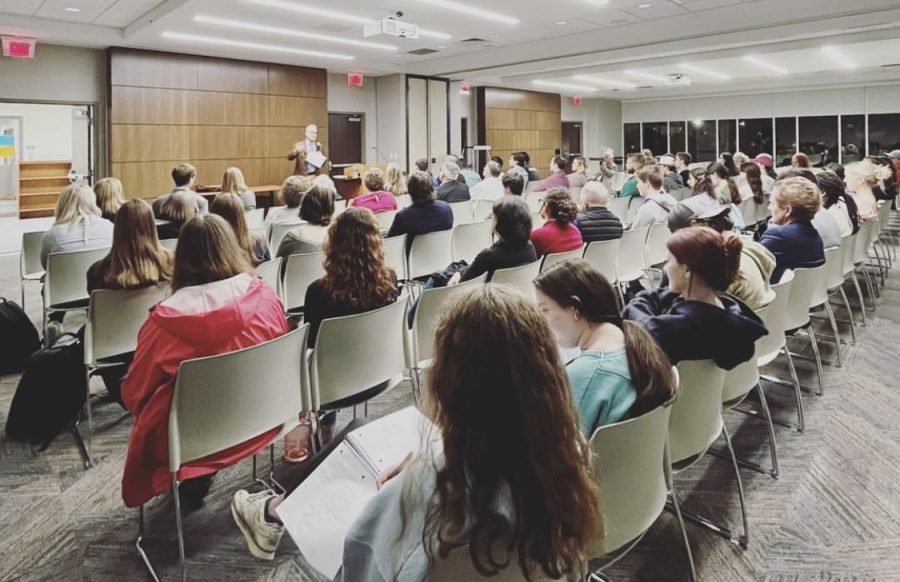Big Thought lecture series asks, “Is America a Christian nation?”
The Big Thought series kicked off with Dr. Russell Muirhead’s Sept 20th lecture.
October 20, 2022
The Gregory J. Grappone ’04 Humanities Institute’s 2022-2023 Big Thought series “Believe It or Not” is in full swing. Working through a year-long series of seven lectures, panels, and discussions, the Institute invites members of the Saint Anselm College community and beyond to share many perspectives on the “origin, nature, and consequences of our individual and shared beliefs.”
“This year’s theme is ‘Believe It or Not,’” explained Professor Gary Bouchard, director of the Grappone Humanities Institute.“It’s fairly simple: there’s the things in life that we know because we can observe them as physically evident to us, factual, and there’s the things in life that we believe. This series is focused on the things that we believe.”
People’s relationship with belief is of particular relevance to Saint Anselm College: “We’re a college that exists because people believe in God and believe in the tenets of the Catholic faith. That’s why they founded this institution,” Professor Bouchard said. “Belief is at the center of the college’s founding, and its mission and its purpose and identity, and yet, a lot of people are attracted to and thrive in this community who don’t believe in those things. “
Dr. Russell Muirhead, a professor at Dartmouth College, gave this year’s series opening keynote lecture, “Belief in the Legitimate Opposition,” on September 20. According to Professor Bouchard, ninety-one people attended the opening lecture either in person or online.
The second lecture in the series, “Is America Still One Nation Under God?” took place Thursday, October 20. Professor Andrew Moore and Ryan Raybuck ‘23 discussed religion, specifically Christianity, in American public life.
“It’s something I’ve thought a lot about over the years: whether the U.S. is a Christian nation or not, and what that means. Over the years I have read things, and as I’ve thought about this lecture specifically, I’ve gone back and reread some books and articles and read some things for the first time,” Professor Moore explained before the lecture. “It’s a topic that I have changed my mind about over the years. I’ve gone back and forth.”
Moore explained further, “I’m going to argue basically that the US since its founding, since its colonization has had Christian culture, [or] Christian-ish culture. Since the founding, the Constitution and all, that Christian culture has been in tension with secular impulses. The constitution itself of course is secular, the government is set up as secular… but that secular nature of the constitution has accompanied this Christian culture. I think the founders assumed that Christianity would play a role in public virtue, but at the same time there was no established Christian religion, at least not at the national level.”
Raybuck, a Communication major, said he was invited by Prof. Bouchard to speak from the perspective of a Christian young adult. “I’m so thankful he brought it to my attention as I am excited to have the privilege of being more involved with extracurricular activities here at Saint Anselm,” Raybuck said.
“One perspective is of the middle aged academic but students, your experience with public Christianity is different than mine,” Professor Moore said, “when I was… just finishing college, a lot of this culture war stuff was still in its early stages politically.”
The Grappone Humanities Institute has sponsored major programming in addition to weekly Come Friday discussion forums for the past few years. Beginning with last year’s “A River Runs Through Us” series on the Merrimack River, this programming has been branded as a year-long “Big Thought” series centered around a theme.
“The idea of the Big Thought series is to choose an idea or theme that is broad enough but is relevant enough to invite any discipline at the college, any major if you will, any perspective to be able to speak about some aspect of that theme,” Bouchard explained.
Those responsible for organizing the series hope that members of the college community will attend the events. These questions about belief are believed to be very relevant both to the college and the public.
“We’re living in a time where people believe crazy stuff,” Professor Bouchard said. “A lot of what we used to call political positions are really matters of religious zeal: QAnon being the most obvious example, somewhat cultish worship of Donald Trump being another. This is not just a political opinion you have. I don’t think people were storming the capitol on January 6th because they had a political opinion. There was something far more zealous bordering on religious belief.”
The next event in the series, “What Do Believers Believe?” will be a panel featuring three ordained Christian ministers associated with the college discussing the beliefs, thoughts, and feelings of their different congregations. The panel will be held November 17 at 7pm in the Event Space of the Student Center. Four more events in the series will take place in the spring semester.



